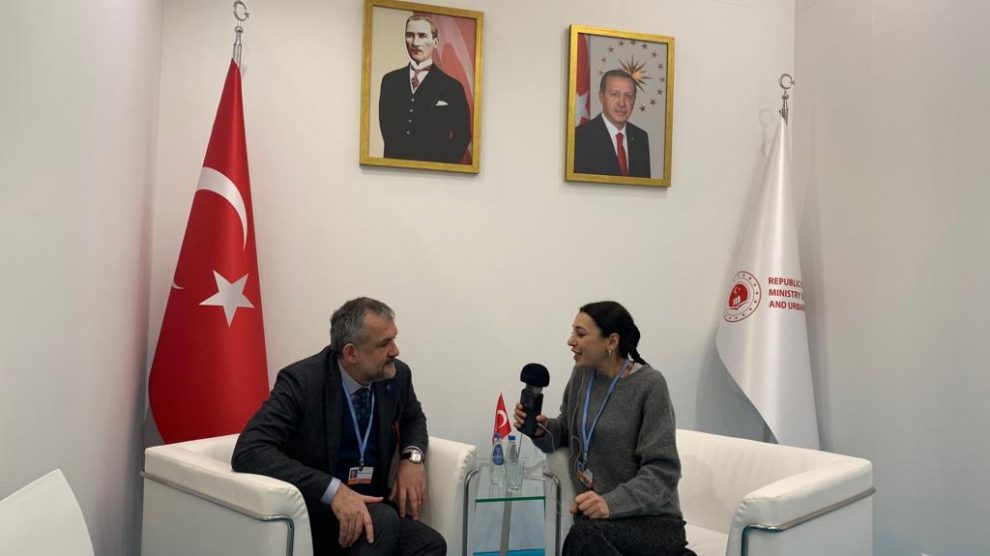Journalist Melis Alphan: We are at the United Nations Climate Summit and I am hosting Professor Mehmet Emin Birpınar, Turkey’s Chief Negotiator for Climate Change. What is happening here? You have been repeating the same thing over and over again for years, but can you summarize it for us? Everybody is asking you when the Parliament will ratify the Paris Agreement.
Chief Negotiator Mehmet Emin Birpınar: This is the classic question. It is an issue that is frequently raised by NGOs, the media and sometimes the opposition parties in Turkey. Their demand from us is to approve the ratification of the Paris Agreement in the parliament. Nobody is discussing the reason why we need to ratify PA, if it is to Turkey’s advantage or if it has shortcomings. Climate change negotiations are strenuous processes. For the last 5 years, I have attended all meetings and summits as Turkey’s Chief Climate Change Negotiator. I’ve flown 300 times in order to find a solution to Turkey’s issue.
Unfortunately, a mistake was made in 1992. Turkey was inaccurately categorized in the Annexes. But this is not the word of God. In the framework agreement, Turkey was listed among developed countries that are required to achieve absolute emissions reduction targets. Therefore, we were placed among countries that cannot receive financial support. The Paris Agreement is a system of common but differentiated responsibilities, where each country needs to contribute in line with what they could deliver. PA’s system is not a top-down or bottom-up system; the spirit is for everyone to assume responsibility and deliver as much as they could. This is what we understood: All countries should submit the INDCs. Turkey’s target is a 21% reduction in emissions compared to Business as Usual (BAU) level by 2030. We officially submitted it to the Secretariat. We want to be listed among developing countries such as South Korea, Argentina, Mexico, Brazil, Chile, Saudi Arabia, and China. These countries can receive financial support. They will receive financial support from countries such as the USA, UK, EU countries and New Zealand. And these are not all grants, some are credit loans.
MA: And the Green Climate Fund…
The essence of the Green Climate Fund is the following: developed countries provide money to this fund and developing countries receive money from this fund. There will be around 100 billion US dollars in this fund. This is the fund that is envisioned. 50 billion dollars will be spent on adaptation. This amount will be donated to the least developed countries and small island nations. The remaining 50 billion dollars will be used for emission reductions. The real issue is not this money, we don’t want this money. The Green Climate Fund is generally being utilized as a ratchet mechanism for private sector funds. For instance, let’s suppose the European Investment Bank will be financing a regional project. The GCF will be a co-funder with 10%, and the EIB will put up the remaining 90%. Alongside private sector finance that will be leveraged, the seed fund provided by GCF will turn into a say 20-billion-dollar project. The current system does not allow Turkey to participate in this 20 billion-dollar project, due to its ineligibility to GCF funds. In effect, this is impeding Turkey’s participation in regional projects and its access to multilateral bank loans.
MA: As you mentioned before, this is happening because of a technical error made in the past. There have been efforts to change Turkey’s status for years. What is the latest situation?
MEB: In essence, we are trying to defend Turkey’s interests. Turkey is a rapidly developing country. Therefore, we are opposing everything that can hinder Turkey’s development. Plus, the climate negotiations are not only about the mandate of the Ministry of Environment and Urbanization. This is about Turkey. We have teams from the Ministry of Finance and Treasury. They undertake negotiations for the funds on their own fronts. The international credit or finance issues are their domain. We confer with them. We have to rely on their opinion. There are various teams from various ministries here at COP. Negotiations are a matter of mass effort, I am just in charge of the all thing. We negotiate among ourselves before we negotiate with the rest of the world. We have to convince other ministries, as well. They are looking at things from their own perspective.
Promises were made to us in Paris. They even made promises to our President Erdogan. We were not going to accept the adaption of the Paris Agreement at the plenary meeting in 2015. Both Merkel and Hollande called our President twice in the same day, telling that the Paris Agreement was an important agreement that Turkey should not oppose. They promised us to resolve this issue during their respective term presidencies. President Erdoğan called us, informed us about these promises and instructed us not to oppose it. However, throughout the year following the Paris Agreement, France did not provide the necessary support to figure out a solution. Afterwards, we went to Marrakesh. We met with the Moroccan Presidency to solve the issue. They began an open-ended consultative process. We communicated to each of the 195 countries the reasons why Turkey needs the GCF and the multilateral bank loans. We expressed that the main reason behind our demands was to scale up Turkey’s fight against climate change, that we could achieve further emission reductions and increase uptake of renewable energy if we had access to these funds.All of this requires money. Turkey needs to allocate 1000 euros per capita to reach the EU’s environmental standards. With a population of 80 million, this means 80 billion euros. We cannot achieve this by our own means. This is impossible not just for us, but for all developing countries. We need international loans. We want to borrow. We want to achieve this with low-interest loans that we use successfully. Banks such as the World Bank and the European Investment Bank consider Turkey as a good partner. They themselves want to provide loans because they see us as a country that pays back its debt. If you block this with the decisions you take here, Turkey could drift away from these funds. This would mean that Turkey would not be able to fight climate change.
Let’s ratify the Paris Agreement. It will take only an hour. But, if thereafter Turkey cannot benefit from these funds, Turkey will not be able to fight climate change. I am calling upon NGOs to support us. We want to access these funds in order to better combat climate change. A few days ago, the Parliament passed the off-shore law. We changed the coastal law so that it will allow for building off-shore wind power turbines. The UK meets more than 50% of its energy demand from off-shore wind farms. We saw that Turkey has this potential as well, and we are trying to achieve this. However, a wind turbine costs one million dollars. We need thousands of them. This is why we need international funds. Unlike in Europe, Turkey’s per capita savings is quite low. With an increasing population and especially because of the increasing numbers of Syrian refugees, Turkey needs to allocate around 10 billion dollars every year to meet increasing energy demand. Where are we going to find this money? We need access to international loans.
Something interesting happened recently. The European Investment Bank prepared a regional climate change program on renewable energy that included us. GCF’s contribution was 10%. Yet, GCF said that Turkey was not qualified and if Turkey was to partake in the project they would pull back from the project. As a result, unfortunately, Turkey was excluded from the project. The total size of the project rose to 50 billion dollars and Turkey could not benefit from this project.
Turkey is classified as a non-eligible country for funding mechanisms. All we wish for is the following: We do not expect direct grants from the Green Climate Fund. We are after the funds to be allocated to LDCs and small island states. On the contrary, we are already providing them development aids. What we demand is to have access to credit and debt instruments necessary for emission reduction and renewable energy investments. If these obstacles are overcome, it will only take a minute for the Turkish Parliament to ratify the Paris Agreement. We are so sensitive to this issue that we submitted our candidacy to host the 2020 COP back in 2015. It was a formal submission, instructed to us by President Erdoğan.
MA: Turkey proposed a draft agenda to leave Annex-I in COP24…
MEB: What we demand is to access funds to fight against climate change. There wasn’t any clue of a positive COP decision at the beginning of the COP24, so we decided to open a discussion for us to leave Annex-I. We will be able to fight climate change better as a Non-Annex country. Exclude Turkey from Annex-I, list us together with countries such as China, South Korea, and Mexico, and we will be able to contribute more to global climate change mitigation efforts. This is what we are here to communicate.
UNFCCC parties do not want to play around too much with the system. We understand this. If a door is opened for Turkey, other countries might demand changes in their categorizations as well. And nobody wants that. This is why we were asked to hold on and we accepted it.They told us that they will fight for us. The Presidency has yet again made promises. They once again designated France to conduct talks regarding Turkey, in order to come up with a decision, which at least secures that Turkey is not deprived of loans. The EU teams are conducting talks in this regard with all negotiating groups, countries us. We are waiting for a decision to be reached by the end of this week.
MA: Let us say that the negotiations will bear undesired outcomes and Turkey will not be granted access to the GCF. Will Turkey cease to fight against climate change? This is also a matter of where public funds are allocated. Will climate change not be a priority? Will Turkey be a laggard in this regard?
MEB: This is not how we approach the issue. The fight against climate change will continue. And our priority will be renewable energy. We do not have fossil fuel resources. We are poor in terms of hydrocarbon resources. We don’t have sufficient and good quality coal.We do not have natural gas. We do not have oil. Therefore, the more renewable energy capacity we build, the more it will be to our country’s advantage. We will head towards this direction to the extent that is possible. If we cannot get those loans, we will try to find another solution. But, if the global community is expecting Turkey to be a part of the system and contribute …
Turkey is a very big country. Only Istanbul has a larger population than the Balkans. I don’t think that the global community wants to leave Turkey out of this system. I think that there will be a solution.However, we will continue our fight against climate change even in the absence of a solution. This is not easy. I am tired, but this should not mean that we will not fight. We are tired of repeating the same words over and over again. It’s not easy. We have to explain and convince each one of the 195 parties to the Convention. This is what we have been doing since the beginning.
We have to go beyond the “Turkey has to ratify the Paris Agreement; Turkish Parliament has to pass it” discourse. What is important is what you deliver as climate action.Okay, let’s ratify PA. But will we able to fight climate change? We want these funds in order to be able to fight climate change. As you know, in a recent statement from the Secretariat, Turkey was listed among countries that can easily achieve their NDC targets -its target to reduce emissions by 21% from BAU levels by 2030. Turkey will achieve this, and it will surpass this target. This is not just a give and take issue. I find it meaningless that some countries, and most notably developed countries, oppose it because they think that Turkey will take their share. Turkey’s potential is obvious. We want access to funds of the multilateral banks, who are keen on providing us loans. They want to provide us with these loans, and we want to take these funds and pay them back. I have to emphasize that we do not want other nations’ share. We explained this to everyone. And we expect them to understand us. We are following the process thoroughly. Turkey is following all of the climate change meetings. Turkey provides its opinion and contributes to each of these meetings. Turkey is by no means a laggard. Why aren’t we falling behind? Because we are one the countries that are already facing those devastating impacts. Very recently we had floods in the Black Sea region, in which claimed the life of a citizen. Last year, Istanbul was badly damaged. The Mediterranean Basin is among the basins that will be the most impacted by climate change.
MA: Germanwatch announced that the cost of climate change related disasters to Turkey was 1.9 billion dollars.
MEB: We want to express that we are aware of this. We used to have a Climate Change Department in our ministry. We now have established a second department called Climate Change Adaptation. We said that there should be a climate change department within all the general directorates, in order to make sure that the paradigm of climate change is integrated into all infrastructure projects. You have to take impacts of climate change into account even when deciding the size of the water pipes. You need bigger pipes because of climate change. The climate change impacts are everywhere. Floods occur even in cities with good infrastructures, such as Berlin, Rome, and Madrid. Even developed countries are finding it hard to cope with the new impacts of climate change so. Climate change should be a parameter in every public service.
That’s what we are trying to introduce in Turkey. We will continue to do it. We will continue to fight climate change. Fighting climate change is to our advantage. It is for our children’s future. If we are granted access to the relevant funds, we can fight climate change more rapidly and we will be able to contribute more to the global efforts. Environmental issues recognize no boundaries and are detached from politics. Environmental and climate issues are universal. This is why we have to act together and head together towards a common goal. As a matter of fact, world countries who cannot agree on almost any issue, are coming together under the UN to sign an important consensus. I would like to express my appreciation regarding this phenomenon. We do not intend to harm this system. Our negotiation position is all about how we can ratchet up our contribution.




